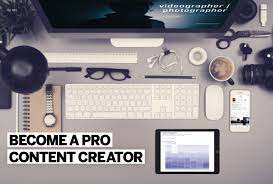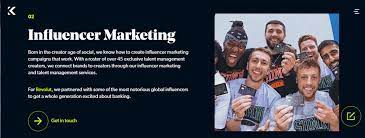Empowering Engagement: The Impact of Content Creators in the Digital Age
The Rise of Content Creators: Shaping the Digital Landscape
In today’s digital age, content creators play a pivotal role in shaping the online landscape. With the rise of social media platforms, streaming services, and digital marketing, content creators have become influential voices that connect with audiences worldwide.
Content creators are individuals or groups who produce and share engaging and valuable content across various online platforms. They come from diverse backgrounds and specialise in different niches, including vlogging, podcasting, blogging, photography, graphic design, and more.
One of the key reasons for the popularity of content creators is their ability to create authentic and relatable content that resonates with their audience. By sharing their personal experiences, expertise, creativity, and unique perspectives, content creators can build a loyal following and establish themselves as trusted influencers in their respective fields.
Content creators also play a crucial role in driving engagement and fostering communities online. Through interactive content such as live streams, Q&A sessions, polls, and collaborations with other creators, they create immersive experiences that keep audiences coming back for more.
Moreover, content creators have revolutionised the way brands interact with consumers. Influencer marketing has become a powerful tool for brands to reach target audiences authentically through partnerships with content creators who align with their values and objectives.
As the digital landscape continues to evolve rapidly, content creators will continue to shape trends and influence how we consume information and entertainment online. Their creativity, innovation, and ability to adapt to changing technologies make them indispensable players in the ever-expanding world of digital media.
Whether you’re a fan of their work or looking to collaborate with them for your brand’s marketing strategy, content creators are here to stay – driving engagement, sparking conversations, and shaping the future of digital communication.
Five Key Advantages of Being a Content Creator in Today’s Digital Landscape
- Content creators can reach a global audience and connect with people from diverse backgrounds.
- They have the flexibility to express their creativity and share their unique perspectives on various topics.
- Content creators can build a loyal community of followers who engage with their content regularly.
- They play a significant role in influencing consumer behaviour and shaping trends in the digital space.
- Content creators have the opportunity to collaborate with brands and monetise their content through partnerships and sponsorships.
Challenges Facing Content Creators: Burnout, Oversaturation, and Uncertain Income
Content creators can reach a global audience and connect with people from diverse backgrounds.
Content creators have the remarkable ability to reach a global audience and connect with individuals from diverse backgrounds. By sharing their content online, they can transcend geographical boundaries and cultural differences, creating a sense of community and inclusivity. This unique aspect of content creation allows creators to engage with people from around the world, fostering understanding, empathy, and shared experiences across various cultures and perspectives.
They have the flexibility to express their creativity and share their unique perspectives on various topics.
Content creators possess the valuable pro of having the flexibility to express their creativity and share their unique perspectives on a wide range of topics. This freedom allows them to craft content that is authentic, engaging, and reflective of their individuality, enabling them to connect with audiences on a deeper level. By leveraging their creative talents and personal insights, content creators can offer fresh and diverse viewpoints that enrich the digital landscape and spark meaningful conversations among their followers.
Content creators can build a loyal community of followers who engage with their content regularly.
Content creators have the remarkable ability to cultivate a dedicated community of followers who actively engage with their content on a regular basis. By consistently delivering valuable and engaging material that resonates with their audience, content creators foster strong connections and build trust with their followers. This loyal community not only supports the creator’s work but also contributes to a vibrant and interactive online environment where meaningful conversations and relationships flourish.
They play a significant role in influencing consumer behaviour and shaping trends in the digital space.
Content creators play a significant role in influencing consumer behaviour and shaping trends in the digital space. Through their authentic storytelling, engaging content, and relatable personalities, content creators have the power to sway consumer preferences, drive purchasing decisions, and set new standards for online engagement. Their ability to connect with audiences on a personal level allows them to influence how products are perceived, how brands are perceived, and ultimately how trends evolve in the dynamic digital landscape.
Content creators have the opportunity to collaborate with brands and monetise their content through partnerships and sponsorships.
Content creators have a valuable opportunity to collaborate with brands and monetise their content through partnerships and sponsorships. By aligning with brands that resonate with their audience and values, content creators can not only enhance their credibility but also generate income from sponsored content. These collaborations allow creators to showcase products or services authentically while providing brands with a platform to reach a targeted audience in a more engaging and organic way. This mutually beneficial relationship enables content creators to turn their passion into a sustainable career while offering brands an effective channel to connect with potential customers through trusted influencers.
1. Burnout
One significant con that content creators frequently encounter is burnout. The relentless pressure to continuously deliver top-notch content can take its toll, resulting in burnout as creators strive to meet the demands of producing and sustaining an engaging online presence. The constant need to generate fresh ideas, maintain audience engagement, and adhere to demanding schedules can lead to exhaustion and decreased motivation, impacting both the quality of content produced and the creator’s overall well-being. Burnout among content creators serves as a reminder of the importance of self-care and setting realistic boundaries in the fast-paced world of digital content creation.
2. Oversaturation
In the realm of content creation, a significant drawback is the issue of oversaturation. With the exponential growth of content creators across diverse niches, the digital space has become inundated with an overwhelming amount of content. This oversaturation poses a considerable challenge for individual creators striving to distinguish themselves and capture the attention of a loyal audience amidst the sea of competing voices. As a result, standing out in this crowded landscape requires not only exceptional creativity and quality but also strategic marketing and engagement tactics to navigate through the noise and carve out a unique presence that resonates with viewers.
3. Uncertain Income
Content creators often face the challenge of uncertain income, which can make financial stability a constant concern. Their revenue streams depend on variables such as ad revenue, sponsorships, and affiliate marketing, all of which can fluctuate unpredictably. This instability in income can create stress and uncertainty for content creators, making it challenging for them to plan for the future or rely on a consistent source of earnings.












